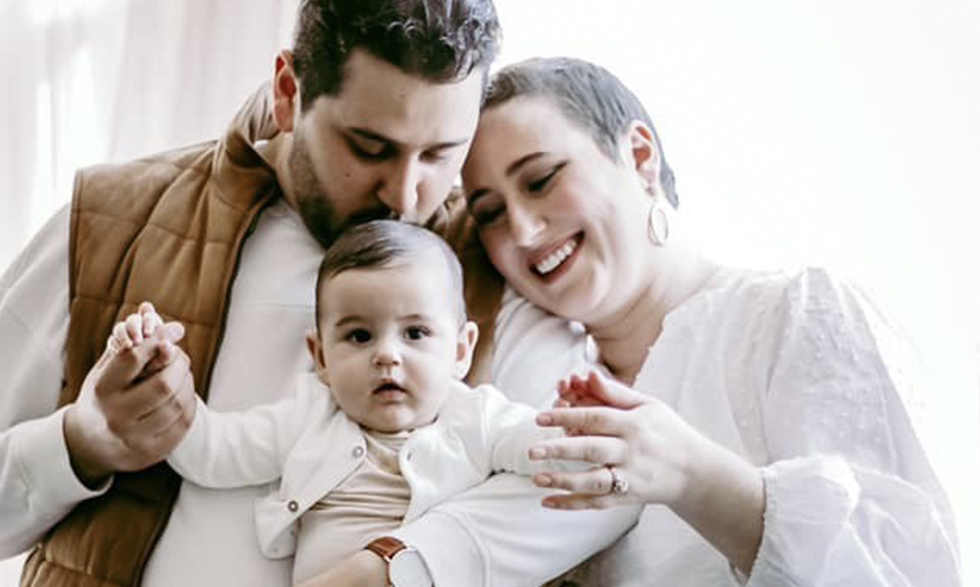
Last updated on July 22nd, 2024 at 11:43 am
Ashli Brown of Chicago was diagnosed with breast cancer in 2019 at age 29, when she was six months pregnant.
I was about 24 weeks pregnant when I felt a lump in my left breast. I figured it was just some weird pregnancy thing, but I mentioned it to my obstetrician [a doctor who focuses on pregnancy and childbirth] at my next checkup. She said I definitely needed an ultrasound. So, I got an ultrasound, a mammogram, and then a biopsy. I knew I had breast cancer from the reaction on the radiologist’s face, even before I got the call confirming it the next day.
“Have the courage, even if it’s hard, to speak up to your doctor about what you’re feeling and make sure you’re being listened to.”
– Ashli Brown
The first two weeks, as we waited for further information, were pretty terrifying. None of my family has had cancer, so this was something we never expected.
The doctor told me I had stage II invasive ductal carcinoma. I had three tumors, one large and two very small. My first course of action was to go to Northwestern University, where they assembled a team of doctors for me.
Because I was so far along in my pregnancy, they didn’t want to do surgery yet, but they did want me to do three rounds of chemotherapy. I didn’t even realize you could do that, but my doctor said they had 20 years of research showing it was safe for the baby. By my ninth month I was bald—I looked like an alien experiment gone wrong—but I made it to 40 weeks, which was amazing. They induced labor, and 24 hours later I gave birth to a perfectly healthy little boy.
Two weeks later, I started five more rounds of chemo, followed by a mastectomy of my left breast. To my doctor’s surprise, I decided against breast reconstruction. I had spent so much time away from my baby, trying to recover, I just couldn’t face any more surgery. For me, it was the right decision.
Ashli’s advice to other patients:
Find a support group. I joined a support group of other young cancer patients and survivors when I was still pregnant, and I swear it saved my life. I have a good support system of family and friends, which is a privilege a lot of people don’t have, but cancer can still be a really lonely place to be. Having other people who had gone through the experience, or were still in treatment or in remission, really helped. I made some wonderful friends in that group. I’ve met people online who have helped me as well. Finding an organization that can connect you with other patients is one of the best things you can do for yourself.
Let yourself feel everything. Being diagnosed with cancer is emotionally complex. There are days when you’ll feel happy, days when you’re overwhelmed and it’s hard to get out of bed, days when you’re angry or grieving. All of this is normal. A fellow cancer survivor told me, “It’s your right to feel mad, sad, or angry. But once the feeling is not serving you anymore, let it go. This is just a chapter in your life. It doesn’t define you. You are more than just cancer.” That truly helped me feel strong, positive, and hopeful.
Speak up for yourself. Have the courage, even if it’s hard, to speak up to your doctor about what you’re feeling and make sure you’re being listened to. For example, one medication gave me really bad neuropathy [nerve pain and muscle weakness] in my legs. When I first mentioned it, I was told it was to be expected. But by the last dose, I was having trouble walking. I told my doctor, “I need you to listen and help me. I have to take care of my child.” And she lowered my dose.
Keep a sense of humor. I know this isn’t everyone’s cup of tea, but being able to laugh at your cancer experience can help. There’s an Instagram account called The Cancer Patient (@thecancerpatient) that’s a satirical look at life as a young adult cancer patient. It sometimes can be R-rated, but it’s really funny and it gave my husband and me ways to laugh instead of just crying.
